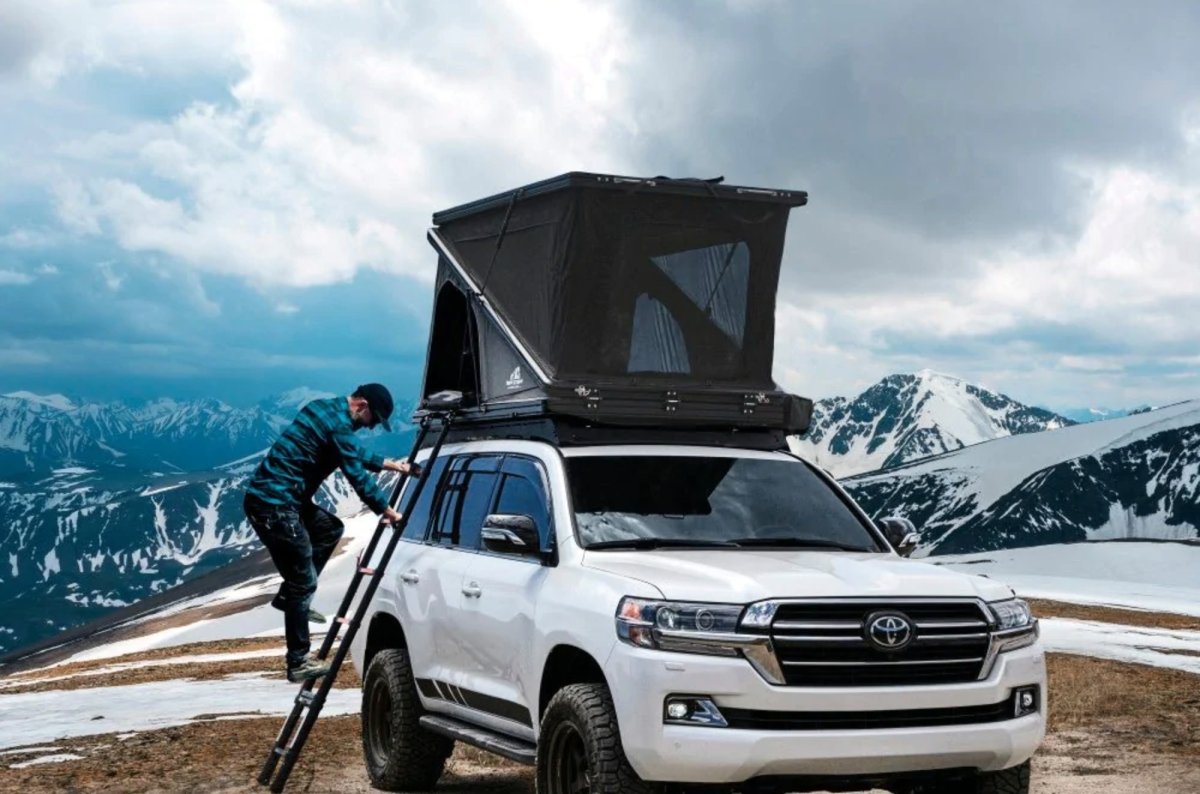Rooftop tents are a fantastic way to elevate your regular camping experience. Although they offer a highly comfortable night's rest under the stars, their comfort cannot be thoroughly enjoyed without the best rooftop tent mattresses.
Like regular mattresses, rooftop tent mattresses come in different types and sizes. To help you sleep better under the stars, here’s a guide to picking out the best rooftop mattresses and toppers.
Getting Comfy In Your Rooftop Tent
Rooftop tents are already made to be incredibly comfortable, or at least more comfortable than regular floor tents. After all, they are built to be set up easily, brought down as easily as they are set up, and used on the go.
However, to maximize the comfort that your rooftop tent offers, you have to put in some effort. One of the many things that you can do to make your rooftop tent camping experience more delightful is to invest in the right mattress or topper.
Rooftop tents are any camper’s dream. These durable structures were built to offer a better outdoor experience while offering the luxury that regular ground tents cannot.
Rooftop tents, like conventional ground tents, are designed to offer shelter outdoors. However, their contemporary design allows the structures to be fitted on the roof of a car and not on the floor.
Being installed on the roof of vehicles offers a vantage point that being on the ground cannot. Being on the roof of your vehicle means it is easier to bring your rooftop tent with you wherever you go. This means you can camp on any terrain you find yourself in, especially if you can find a safe spot to park your vehicle comfortably.
Being off the ground also means you are away from the inconveniences of camping outdoors, like a muddy tent when it rains and the creeping insects and animals that come out to play at night (while you're here, check out the U.S. National Park Service’s tips for staying safe outdoors).
Although these are great, rooftop tents, like regular ground tents, have essentially accessory needs that you cannot do without, primarily if you aim to be extremely comfortable in your rooftop tent. This ‘essential need’ is a comfortable sleeping area.
In any camping tent, rooftop, or otherwise, you will need a mattress and other sleeping accessories. However, while a hard pillow can be managed for the duration of your camping trip, the mattress you choose can make or break your camping trip.
Rooftop tents are light enough not to weigh down on and ruin vehicle roofs. However, they are heavy enough to hold the occupants’ weight along with other essential sleep gear like mattresses, toppers, bedsheets, blankets, and pillows (does the rooftop tent weight impact your vehicle’s gas mileage? Check out your answer here!).
Like the rooftop tents, the mattresses come in different sizes and types, all of which have varying effects on the quality of a person’s camping trips.
Many rooftop tents come with custom mattresses. Although this helps to save money that will otherwise be spent on purchasing a mattress separately, it is important to note that not all custom rooftop mattresses are end game to ultimate camping comfort.

Does Rooftop Mattress Type Matter?
Among the many rooftop tents frequently asked questions that campers have, one prevalent one is ‘does rooftop mattress type matter?’.
The short answer is yes.
Just as you won’t be comfortable in a lumpy or overly hard mattress at home, you should not have to deal with uncomfortable beds outdoors. After all, you will only be able to enjoy your outdoor life when you feel refreshed every day, and you can only achieve this with a good night's rest.
Although rooftop tents eliminate the inconvenience of feeling bits of rocks and sticks poking through your camp mattress when you use ground tents, it doesn’t mean that it immediately solves all inconveniences that come with sleeping on a hard surface. The floor of a rooftop tent might be made of the strongest materials, and flat and smooth, but they are also hard and can be uncomfortable to feel through bad quality mattresses.
Although it might look like an easy solution to bring a regular thick home mattress into the tent, it is never a good idea to do so. While regular mattresses are comfortable, they are too bulky to fit into a rooftop tent. They will make the rooftop tent too heavy and will not make it easy to close the tent when it is not being used.
Additionally, regular mattresses will often not fit a rooftop tent’s dimensions. Although you might think cutting up an old traditional mattress for your rooftop tent is an economical option, it is not always the best option.
The best option will be to get a rooftop tent mattress built for rooftop tents. These tents come in different types (memory or air mattresses) and make it easier to use your rooftop tent.
Rooftop tents often come with mattresses. These mattresses come customized in the size of the rooftop tent you purchase. They are easy to fold up when the tent is not used as they are the proper dimensions and often made in the right thickness. However, they are simply not as comfortable as you need them to be. Or they have been used so much that they are starting to sag in places.
When this happens, the only other option will be to purchase a mattress separately or get a mattress topper.
What Is A Mattress Topper?
A mattress topper is a layer of memory foam, latex, or other materials that go on top of mattresses. It is a great way to make mattresses more comfortable to sleep in.
Mattress toppers are an excellent option for uncomfortable or old mattresses, as they make inconvenient mattresses immediately more plush and comfortable. They can also be put on top of comfortable rooftop mattresses to add more comfort without altering the firmness level.
Mattress toppers can also function as temporary rooftop tent mattresses when necessary. They are multi-functional and are a simple way to make sleeping in rooftop tents more convenient. They are easy to use and cost-effective for uncomfortable rooftop tent mattresses.
However, like rooftop tent mattresses, not all toppers can be used in rooftop tents. Although they are a general solution to making mattresses more comfortable, rooftop tent mattress toppers need to be more than just relaxing.
So, how do you pick rooftop tent mattresses and mattress toppers to make you more comfortable while you enjoy outdoor camping experiences?
How To Pick A Rooftop Mattress And Topper
Choosing the right rooftop tent mattress and toppers for you and your tent is your best bet for enjoying an extremely comfortable sleep on the road. Investing in high-quality rooftop tents will help you maximize the true comfort that rooftop tents offer. To pick a rooftop mattress and topper:

1. Know the Difference
Rooftop mattresses come in different types. The materials vary and offer varying extents of comfort, durability, and, of course, disadvantages. Essentially, not all beds are the same.
If you are trying to replace your old mattress or purchase a new one for your tent, it is essential to know the differences between each mattress.
- Air mattress
Wouldn’t it be fun to sleep on your own air cloud? Air mattresses are a standard and affordable mattress option among campers, both rooftop tent and ground tent users alike. These mattresses are one of the easiest ways to make camping comfortable without breaking the bank. Typically filled with air, air mattresses are not bulk and are, therefore, an excellent option for many rooftop tent users. However, they come with disadvantages.
Because air mattresses can be inflated to reach any firmness you like, you can control the comfort your mattress offers. The air offers a welcome buffering and cushioning effect that keeps your body from feeling the friends of the aluminum flooring in your tent. They also come in varying sizes, making it easier to find an option that works for your rooftop tent. The best part about using inflatable air mattresses is they can be used outside rooftop tents.
Although they are an excellent mattress option, you may want to skip air mattresses for insulation and durability problems.
When it gets cold, the air mattress can also get cold. As the air in the mattress loses heat, you will get increasingly chilly. This is not a great experience if your rooftop tent lacks the insulation to keep you warm. Conversely, inflatable mattresses are also non-breathable and can become hot and unpleasant in hot weather. Either way, there is no winning in extreme temperatures.
Although this can be resolved by adding extra insulation between the mattress and the floor and the mattress and yourself, it also means you have more sleep gear to carry with you.
There is also the constant worry of inflatable mattresses popping on leaking. What happens when you arrive at the campsite only to find a hole in your mattress?
- Foam Sleeping Pad
Typically made from closed-cell foam (here’s what closed-cell foam or CCF means), foam sleeping pads are also fondly called camping mattresses. They come in various sizes and types, and play essential roles in the quality and warmth of a camper’s sleep.
Sleeping pads are usually lightweight, although they can be bulky, especially if they come in bigger sizes. They can be rolled up or folded to make it easier to pack them into smaller sizes. They are also easy to set up and are one of the simplest bedding any camper can enjoy while exploring the outdoors.
Unlike inflatable or air mattresses, foam sleeping pads have a shorter set-up time, are less noisy, are cheaper, cannot be punctured, and are easier to use. They are also more durable and less prone to insulation problems. However, some people argue that sleeping pads are not as comfortable as some air mattresses. Worse, they can get wet in the rain and take longer to dry. Sleeping pads are also bulkier yet thinner (not a great idea if you have a bad back) and do not have adjustable firmness.
- Memory Foam
The best thing about purchasing a memory foam mattress for your tent is choosing the degree of hardness or softness you want. Nothing beats being able to sink into the comfortable cocoon that memory foam offers out in the wild and being able to enjoy every second of your sleep.
While this is great, many people admit that memory foam mattresses get hard in the cold. This means the support and comfort that the mattress offers might reduce in the cold. In the heat, the foam gets exceptionally soft, so soft that it may become uncomfortable for some.
Inflatable mattresses, memory foams, and sleeping pads are all great options. However, it would be best to weigh the pros and cons before choosing one.
2. Choose a Thin Topper
You may be tempted to choose the thick mattress toppers you want, thinking they will offer more comfort and better insulation. However, thicker toppers are not always the better option.
When choosing a mattress topper, opt for a thinner one with your preferred hardness or softness. They are cheaper, cost-effective, and easier to use. However, the topper's thickness can vary with your preference, as long as you remember, the thinner, the better.
When choosing a mattress topper, focus on using the mattress size, tent size, and preferred thickness as a metric for purchasing a topper. This will ensure you are comfortable without compromising the ability to fold up your tent.
3. Mattress Thickness Matters
Unless you plan to feel the car panel and aluminum flooring whenever you sleep in your rooftop tent, you should pick a mattress that is at least 2.5 inches thick. This will offer a barrier to keep you comfortably off the floor.
4. More Important Aspects
Other than your mattress, some ways you can make your rooftop tent more comfortable include:
- Insulate against cold
In extremely cold temperatures, you need all the heating you can get. One easy way to do this is to insulate your tent to trap heat. You can do this by adding sleeping mats under your mattress as a form of floor insulation, using thermal blankets, and using inner insulation tent layers. For more tips on keeping warm when the temperature drops, here are our tips for surviving outdoors in the cold.
- Promote cooling
Sometimes, it will get so hot that you will need to mask the heat and humidity. You can invest in breathable bedding like bamboo sheets, eucalyptus, and Tencel to help you sleep better in the heat.
- Invest in anti-condensation mats
Anti-condensation mats are an easy way to get rid of moisture problems in your rooftop tent. Because high humidity might make your mattress seem softer and impact your sleep, keeping the moisture out of your tent is an investment that will make your bed feel better and last longer. With anti-condensation mats, you can keep your internal environment fresh while eliminating moisture and condensation.
Getting Comfy In Your RTT
While choosing the right rooftop tent for you and your vehicle matters, choosing the best beddings also plays a crucial role in your comfort. After all, a comfortable rooftop tent won't matter much if you own RTT mattresses that give you sleepless nights.
Want to learn more ways to keep your RTT cozy? Let's start by helping you create your very own diesel heater for less than $150!



